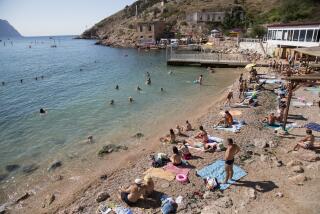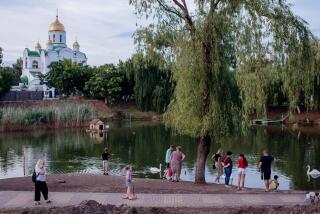POLITICS : Enclave Presents Russia With Its Own Haiti : Moscow lays claim to unruly republic of Chechnya. But it cannot control its rebellious leader. Recent waffling on whether to invade nearly led to bloodshed.
- Share via
MOSCOW — Early this month, Russian diplomats in Washington made a discreet but disturbing inquiry: If you Americans are going to invade Haiti, they asked, would you mind if Russia invaded its own southern corner--an unruly little place called Chechnya?
The Clinton Administration replied that yes, we do mind, according to two specialists familiar with the exchange, and the Russians backed off. But not before Moscow’s open support for a rebel group in Chechnya brought the Caucasus Mountains to the brink of bloodletting.
Chechnya is Russia’s Haiti--a mountainous, ethnic enclave half the Caribbean nation’s size but more dangerous. Moscow considers the oil-producing Muslim republic and its 1.2 million people part of Russia--as does the rest of the world--but cannot control its dictator, a former Soviet bomber pilot named Dzhokar Dudayev, who declared independence in 1991.
Since then, Russian President Boris N. Yeltsin has lived with three unpleasant choices: Topple Dudayev and risk guerrilla war against his many loyalists across the Caucasus. Let Chechnya go and thus embolden other ethnic republics to secede as well. Or forget the place--and the embarrassment of not ruling the whole Russian Federation.
The Kremlin suddenly remembered Chechnya late last month. A mass kidnaping by a Chechen gang and a failed rescue attempt left five people dead in a southern Russian resort. Accusing Dudayev of inciting terrorism and beheading his foes, Yeltsin’s aides embraced a Chechen Provisional Council that favors rejoining Russia.
On Aug. 2, after Russia had halted flights over Chechnya and sealed the border, the opposition council, apparently expecting help from the Russian army, announced it was seizing power and calling new elections. The coup turned out to be wishful thinking, undermined by Yeltsin’s decision not to invade.
It was a prudent choice. Recent polls show that fewer than 10% of all Russians want to force Chechnya back into the fold, perhaps because its warring clans and gunslinger ethos were never tamed by 70 years of Soviet rule. Russians stereotype Chechens as ruthless gangsters who might, if pushed, strike back at Russia’s nuclear power plants.
“If we used force in Chechnya, it would spark an uprising in the Caucasus and lead to such turmoil, so much bloodshed, that no one would forgive us afterward,” Yeltsin said last week.
But he added with a smile, “The role of the opposition (in Chechnya) is growing, and I would not say we have no influence there.”
That influence, however, is limited. The 22-member council is shunned by the bulk of Dudayev’s political foes, who all favor some degree of autonomy from Moscow. Council leader Umar Avturkhanov, who is mayor and former police chief of Znamenskoye, is popular only in his home district, where rubles shipped from Moscow pay public workers’ wages.
Threatening a holy war “that will eclipse Afghanistan,” Dudayev drafted tens of thousands of men into his army this week to resist any invasion. But he has refrained from moving against Avturkhanov, who claims to have won over a tank battalion, two mountain cavalry squadrons and a suicide squad of terrorists from Dudayev’s army.
The Chechen leader is more wary of his best-known compatriot, Ruslan I. Khasbulatov, who came home this summer aiming to unite Chechnya’s fractious opposition. Authorities first put up roadblocks to bar him from towns where he planned to hold rallies, then accused him of treason and took away his citizenship. According to one report--denied by the authorities--a condemned killer was freed from jail to get rid of Khasbulatov.
If Moscow’s air and land blockades eventually force Dudayev down and help Khasbulatov maneuver to the top, it could only mean more bad news for Yeltsin.
It was Khasbulatov, the wily pipe-smoking Chechen, who led Moscow’s Soviet-era Parliament to months of belligerent resistance against his reforms--until Yeltsin ordered tanks to blow up the building last October.
A Troubled Region
The republic of Chechnya and its leader are posing a sticky problem for Russia. Moscow’s support for an opposition group almost led to bloody conflict recently.
More to Read
Sign up for Essential California
The most important California stories and recommendations in your inbox every morning.
You may occasionally receive promotional content from the Los Angeles Times.













